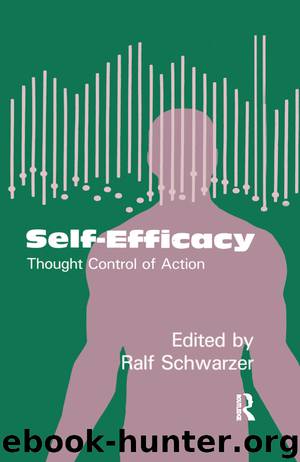Self-Efficacy by Ralf Schwarzer

Author:Ralf Schwarzer
Language: eng
Format: epub
ISBN: 9781317763697
Publisher: Routledge
A Process Model
We have developed a process model of cognitive appraisals (Schwarzer, Jerusalem, & Stiksrud, 1984; Jerusalem, 1990a) which extends Lazarus’ original stress theory by integrating ideas from Seligman’s helplessness theory (Abramson, Seligman, & Teasdale, 1978; Brown & Siegel, 1988; Seligman, 1975). A state of helplessness is predicted as a long-term consequence of cumulative experience of personal uncontrollability. Accordingly, the theoretical model of appraisal processes was built for the special case of continuous failures. Its purpose was to describe the potential development of loss of control and personal helplessness by means of cognitive appraisal processes in academic failure situations. We argue that at almost any point in time, all three cognitive appraisals may occur simultaneously, but to differing degrees, therefore leading to different emotions: Challenge causes curiosity, exploration and productive arousal threat causes anxiety and loss of control causes helplessness or even depression.
Looking at the process model in Figure 1, the x-axis represents the number of failures. The curves characterize the idealized potential development and change of challenge, threat and loss perceptions. With continued experience of failures, challenge diminishes, while loss enhances from one point in time to the next. Threat perceptions first increase and then decrease. Unexpected failures might be interpreted as challenges to one’s competence, whereas threat or even loss are less relevant. If this happens repeatedly, the person will begin to feel more threatened than challenged, but will still persist with the task. The highest degree of threat is located at the point where complete subjective uncertainty about the next outcome prevails. Later, when subsequent failure is expected with higher certainty, the individual will experience loss of control while feeling less threatened because the loss becomes certain. According to this model, four idealized motivational stages can be distinguished:
1. The Challenge Stage is a kind of “reactance stage.” Although the person is challenged by one or more failures, she retains confidence in her ability to cope with the demands. High self-efficacy may be combined with productive arousal, i.e., the tendency to explore the nature of the task.
2. The First Threat Stage occurs when failures mount and threat surpasses challenge appraisal anxiety is the dominant emotion. The combination of anxiety with productive arousal here can be called “facilitating anxiety” because the person is still self-confident and persists with the task.
3. The Second Threat Stage occurs at the culminating point, when there is complete uncertainty about the next outcome. The threat appraisal is combined with less challenge and some loss of control. This mode can be called “debilitating anxiety state” because intrusive self-related cognitions distract from the task. The person worries about his or her performance, capability, and the potential for further failures.
4. Finally, there is a Loss-of-Control Stage. Loss of control is dominant, replacing the appraisal of threat. The student becomes helpless and disengages; the next failure is almost certain. Cognitive appraisals cannot be predicted by the situation at hand exclusively, for example by task-specific failure experiences.
Download
This site does not store any files on its server. We only index and link to content provided by other sites. Please contact the content providers to delete copyright contents if any and email us, we'll remove relevant links or contents immediately.
Rewire Your Anxious Brain by Catherine M. Pittman(18638)
Talking to Strangers by Malcolm Gladwell(13342)
The Art of Thinking Clearly by Rolf Dobelli(10444)
Mindhunter: Inside the FBI's Elite Serial Crime Unit by John E. Douglas & Mark Olshaker(9313)
Becoming Supernatural by Dr. Joe Dispenza(8196)
Change Your Questions, Change Your Life by Marilee Adams(7753)
Nudge - Improving Decisions about Health, Wealth, and Happiness by Thaler Sunstein(7689)
The Road Less Traveled by M. Scott Peck(7592)
The Lost Art of Listening by Michael P. Nichols(7487)
Mastermind: How to Think Like Sherlock Holmes by Maria Konnikova(7313)
Enlightenment Now: The Case for Reason, Science, Humanism, and Progress by Steven Pinker(7305)
Win Bigly by Scott Adams(7183)
The Way of Zen by Alan W. Watts(6594)
Daring Greatly by Brene Brown(6501)
Big Magic: Creative Living Beyond Fear by Elizabeth Gilbert(5753)
Grit by Angela Duckworth(5598)
Ego Is the Enemy by Ryan Holiday(5412)
Men In Love by Nancy Friday(5231)
The Laws of Human Nature by Robert Greene(5169)
